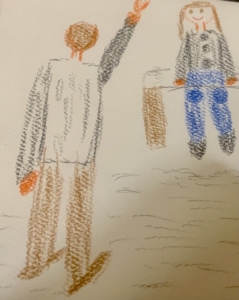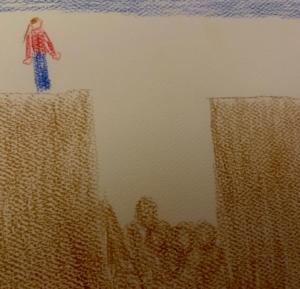With his words, Dr. Sullivan had practically said I didn’t have epilepsy. Not because he believed that, but because I did. Pictured the lakefront the previous spring, the reeling, the gravity, the sweat. Nothing had ever felt so final. That’s what made me think it was leading somewhere.
It was unfair of me to keep it from him. I had to, of course. With his power of persuasion, Dr. Sullivan could talk me out of anything. Besides, he would have required an EEG.
EEG is short for electroencephalogram. The diagnostic test can detect seizure activity in the brain. It would have been so simple, right? Get an EEG and learn if you still had epilepsy? Not quite. While I had health insurance, it wasn’t actually good for anything. Epilepsy is a pre-existing condition. Back then, insurance companies weren’t required to cover pre-existing conditions. And they didn’t.
Not having epilepsy coverage made for a unique type of oppression. At a time when I was flailing in so many ways, the “pre-existing” label kept me down. In taking away insurance coverage, patients lose the power to protect themselves. You know what that means? They have to improvise.
Some are motivated by money, others by the lack of it. Why spend on an EEG when I could taper off for free? That was my philosophy. Can you put a price on having your hopes dashed? ‘Cause that’s what I was doing. How can that be quantified? I might have invested $200 to have my hopes dashed. More than that, really? Who’s paying for it?
The stipend I made as a freelancer — and “stipend” is the right word — covered rent, utilities, any food item in the grocery aisle at Walgreens, and little else. Which means I had to find a way to pay for Everything Else. “Everything Else” is a mighty big bucket. What gets lumped in there depends on the day, ’cause you never know what the world’s gonna bring. The list of options includes, but is not limited to: prescription pills, medical insurance premiums, doctor’s appointments, hair cuts, plane fare home for the holidays, and that’s just the stuff I can remember.
In my life, “Everything Else” was paid for by Mom and Dad. All of it. So before you go asking “Why didn’t she ask her parents to pay for an EEG?” honey, they were paying for my whole life already.
With insurance, getting an EEG was a no-brainer. Without it, the cost made for a convenient excuse. Truth was, I didn’t believe in EEGs. Since age 3, the exams had been an investment of the most brutal kind. Lying on the table, hyperventilating on command, they were an investment of hope. Hope for what might be found at the end of the rainbow. Twice I’d trekked through golden pastures only to find nothing there. It was supposed to be a glorious new beginning, full of hyacinths and butterflies and who the heck knows? But when I got there, down to zero, all I discovered was another seizure.
Just as EEGs were an investment of hope, they were an exercise in fear. Fear that had accumulated over years of annual testing. There’s the glue, ice cold against the scalp. The slight tug upon the hair as the glue takes hold. There’s the harsh scent of rubbing alcohol. Its purpose is to remove the glue when the EEG is over, yet somehow the scent pervades the exam from start to finish. You never forget that smell. An inexplicable chill hangs over the experience, making it all the more synthetic. All the while, they try to trigger a seizure.
Young people have more armor for experiences like that. When they’re asked to be brave, they step up in big ways. For the chronically ill, resilience attaches to the soul. It goes with you everywhere, even when it’s not needed. At 33, I still had the armor of my youth, was just wearing it on my terms. It was a seismic shift, a subtle one, too. Change starts with a series of decisions, then one day you wake up different.
Guess I’d decided. Couldn’t afford an EEG financially. Couldn’t afford it emotionally either.

 Dr. Sullivan was the kind of man who’d appreciate an aged Scotch. He had this wry sense of humor and old-school way of being, as if he might refer to women as “broads.” Handsome in an educated way, he carried himself with a refinement that spoke to East Coast credentials. When he laughed, it was in the moment, making it easy to believe he was behind you.
Dr. Sullivan was the kind of man who’d appreciate an aged Scotch. He had this wry sense of humor and old-school way of being, as if he might refer to women as “broads.” Handsome in an educated way, he carried himself with a refinement that spoke to East Coast credentials. When he laughed, it was in the moment, making it easy to believe he was behind you.